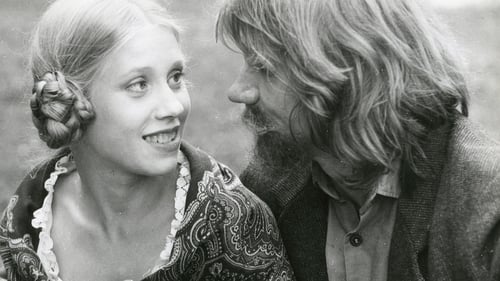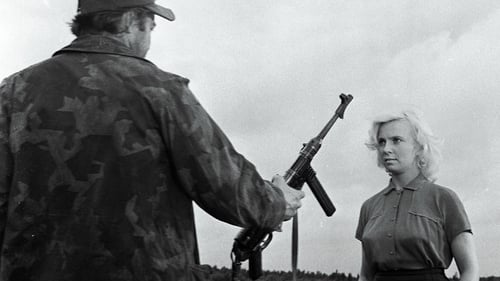
Ada Lundver
出生 : 1942-02-09, Hiiumaa, Estonia
死亡 : 2011-10-06
略歴
Ada Lundver (9 February 1942 – 6 October 2011) was an Estonian film actress and singer. She appeared in nearly thirty films.
Lundver was born in Käina Parish (now, Hiiumaa Parish), on the island of Hiiumaa in 1942. She used to spend each summer on the island with her grandmother.
In 1960 Lundver was working in a shoe factory in Tallinn. The following year, her life was transformed as she was acting with the State Philharmonic of the Estonian SSR. She was chosen from nearly 250 other applicants. She completed a course in pop singing before acting more. She and Eve Kivi became the most well known Estonian actresses. She made films in the 60s, and signed an agreement to make more films in 1969 - becoming the "German slut in Russian movies". She married Mikk Mikiver in 1971 and then made many more films. She made nearly thirty in total including "Cold Land", "What Happened to Andres Lapeteus" and "Noon Barge".
Her marriage to Mikk Mikiver ended in 1983.

Seller
Tom, a wide-eyed, innocent sixteen year-old, finds himself an unwitting accomplice in a deadly game of vengeance and death when he befriends Artur - a Chechen man, hell bent on revenging the torture and murder of his family - on the streets of Tallinn.

Self
Veteran actors from the 3 Baltic countries - Estonia, Latvia and Lithuania - gather at a castle in Latvia to receive awards for their roles as Nazi villains in propagandist Soviet war films. They reminisce about the films that made them famous throughout the USSR, but also stigmatized the Baltic countries as Nazi sympathizers in the eyes of many Russians - a misconception that is nowadays exploited by the Russian media, desperate to label the Baltic countries as a fascist haven.

By chance Erik meets Viivi, an Estonian violinist playing in the Stockholm subway. They start an intense romance. Erik's mother dislikes the relationship, not having forgotten her escape from Estonia during the war. She reveals facts from the past and Erik finds out that his Swedish father adopted him. His real father was an Estonian nazi. Viivi has grown up in communist Estonia where her father was a party member and worked for the KGB.

Madam von Tuzzi
Jüri Rumm is a hot-tempered young peasant who is not afraid of either German barons or the Russian czar, barfights or disobedience to his master's orders. Mari, a gentle peasant girl, loves Jüri despite the fact that he is very popular among young women. Evelin is a quick-tempered baron's daughter who is used to get everything she wants, including a peasant boyfriend who considers himself a free man. Yet, the free man becomes an outlaw. Where will the runaway's love lead him?

Red Cross Official (uncredited)
A film about the life of Raimond Valgre, an Estonian songwriter and singer of the 1930s and 40s, the political changes of his country and his life after the war when his songs were considered not suitable for the Soviet way of life.

Director
A life is difficult even for children during the forties in Estonia...

Lilli
Reet loves her long-distance coxswain husband Reinu, but the long separations have tortured her. It seems to her that the man cares more about his work than about her. Rein really loves his work, but his wife just as passionately. He does not understand how loneliness can overwhelm Reet, when women have always been waiting for men from far away. Their family friend Mart loves Reet and cannot see her suffer. It is in Marti's power to offer Reet a safe life, and the woman plagued by internal struggles makes a choice, but happiness seems to slip even further away.

Woman
A parody of several popular movies such as A Man and Woman (1966) and The Last Relic (1969).

Meeri
Based on Jaan Anvelt's novel "Outlaws" which deals with the struggle of the Estonian Communist Workers' Movement and the life of revolutionaries in the Republic of Estonia in the 1920s. The film represents the maturation and decay of human soul in tense situations. The dark intersections and the dense, abandoned areas create a tumultuous tension field in which the characters find themselves. Their choices and decisions overwhelm them in one way or another. Where is the way out?

In September 1944, Estonia is on the brink of being released from under the occupation of Nazi Germany only to be seized by the Soviet army. This film follows the destinies of two women - Maarja and Leeda - and two men - Gert and Mati - under the harrowing influence of war and foreign occupation.

Hairdresser Leili
The events take place in Estonia in a summer in the 1960s. The Boy and the Girl want to go from mainland Estonia to the island of Saaremaa, but they do not have any money to buy the ticket to the ferry. They manage to hide themselves into a lorry that carries hay. Because they are smoking while they are on the lorry, a fire breaks out. The problem is, that the ferry in the middle of the sea.

Reet Lapeteus
After a long night with his old war buddies, Andres Lapeteus regains consciousness in the hospital. How has confusion, bewilderment and alienation developed between these men who once fought together side by side? Is this the inevitable result of the Stalinist regime, the influence of his social climber wife, or the effect of his personal cowardliness and conformism? What happened to Andres Lapeteus?

Valve





